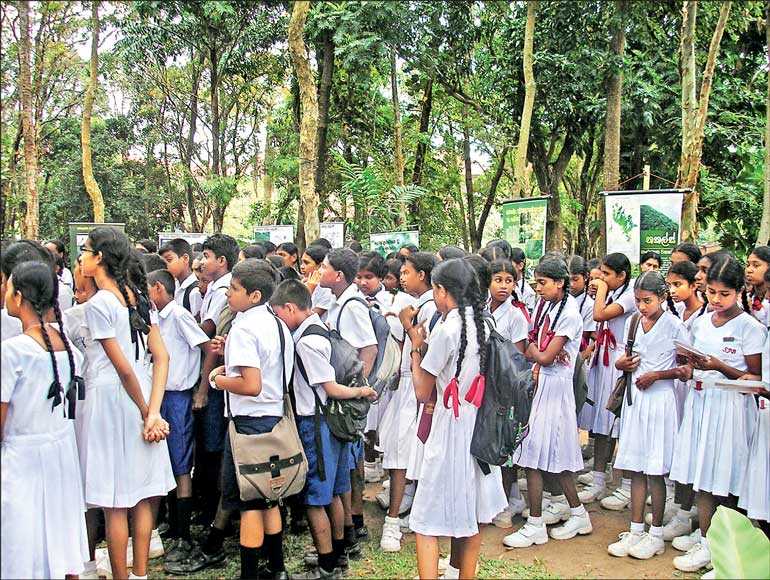Thursday Feb 26, 2026
Thursday Feb 26, 2026
Saturday, 16 May 2020 00:01 - - {{hitsCtrl.values.hits}}

A school program of the Forest Department
 By Suryamithra Vishwa
By Suryamithra Vishwa
Can humans live peacefully with other creatures of the wild; both animals and plants, in a co-existence that will preserve biodiversity for future generations? How much and what do humans need to lead a truly ‘developed’ life? Is our current day education system doing anything to make youth truly ‘developed’ both mentally and spiritually so that they will know to differentiate needs from wants and need from greed?
These above questions are those that many are asking, especially in these times of gross climate ruination caused by humans and in the backdrop of COVID-19 that has shown many across the globe how nature is not dependent on man. Amidst the man-created shrinking of natural forests we need to encourage the average Lankan to respect our wildlife. There is also the need to create a resurgence of agro forestry or biodiversity cultivation in every garden, big or small, replacing the lawn culture that originated in 17th century England that many Sri Lankans seem addicted to.
The past weeks under COVID-19 lockdown saw Sri Lankans who had trees, shrubs and vines that bestowed fruits, herbs and vegetables feeling the most secure and richest of them all. We are certainly going through a new phase that will re-define the concept of wealth. The past few weeks also had many questioning how they had lived in the past and the values that governed such living.
What most of us know as agriculture is monoculture and dependence on chemical induced fertiliser or pesticide. Yet there are agro biodiversity models based on leaving your garden to the dictates of nature by planting some trees, vegetables, fruits and herbs as per choice and then allowing the birds and bees to do the pollination. If we encourage agro forestry in every garden big and small and the mini version of it in pots or on concrete slabs for those with limited garden space we will be on the long road to doing the following; 1. Rectify food insecurity 2. Stop exposing ourselves to poisons from chemical agriculture 3. Rectify biodiversity erosion that has now reached drastic stages. 4. Use gardening as an easy stress busting anti-depressant 5. Put an end to the unnecessary need to waste our national finances on food imports.
If we all, through individual initiative, adopt the agro forestry/biodiversity farming methods in our homes as well as schools and universities and even workplaces, we will be initiating a national movement, starting with each of us.
The good news is that there is much dedication by the Forest Department of Sri Lanka, to promote biodiversity cultivation and agro forestry among homes and schools.
“We have consistently focused on this through diverse programs we have designed for different segments of society. We now realise the need to plan out a detailed program to focus on the health and wellbeing of people through agro forestry especially created for these pandemic times and further strengthen our previous work in this regard,” says Forest Department Assistant Conservator of Forests Asoka Herath.
He points out that there is much emphasis by the Forest Department on encouraging the growth of trees in premises of educational institutes and helping home gardens cultivate through the biodiversity promotion methods.
“We have biodiversity school garden promotion programs. We have carried these programs almost all over Sri Lanka. We provide these schools plants of diverse species, focusing mainly on medicinal and edible plants as well as trees that give shelter. We do awareness programs on how to plant the trees and train them on how to cultivate without chemical fertiliser. We explain to people that they should return to agro forestry and biodiversity cultivation and that there is no need for chemical induced fertiliser that harm the earth.”
“With regard to schools, any school can approach the Forest Department office in their district and make a formal request for the trees they need and we will provide,” he explains.
“Under our home garden program which is for spaces around 20-40 perches we generally provide up to 40 multi-purpose plants. Normally we say 40 perches should be there but we know that land is scarce for most people so we are quite flexible.”
He points out that for city based areas there is the urban garden program.
“The public can purchase plants from the nurseries at the Battaramulla head office, our nurseries in Depanama Pannipitiya and Ratmalana but if they register under the many programs that we have, we provide free, such as under our home garden and school program and the urban garden program.”
He also points out that the Forest Department carries out tree management programs where training is provided on the cultivation of trees for both biodiversity protection and commercial purposes. The cultivation of trees such as Teak, Mahogany, Lunu Hindella, Gini Sapu and Havari Nuga and Kos are encouraged.
“After 20 to 40 years people can economically benefit from using these trees for timber value but we emphasise the need for replanting these trees immediately after felling them. Humans need to have a balance between economic need and eco survival. Ideally we want these people to keep these trees alive for a long time as possible but since survival is also needed, if they cut them, we tell them to plant new trees as soon as possible.”
Asked about trees such as Mee and Kumbuk, which were considered of such sacred stature in Sri Lanka that the kings of Lanka had laws against felling them, he explains how these trees were historically only grown in premises such as temples and devales.
“This was because they had to be safeguarded due to their importance for the soil and biodiversity. But the sad thing is today we see people cutting these also without a second thought. We now encourage the cultivation of these trees as means of helping reverse threats such as climate change as well as restoring our historic respect for them,” says the Forest Department official.